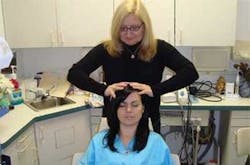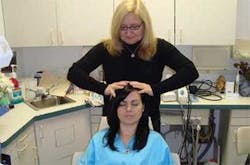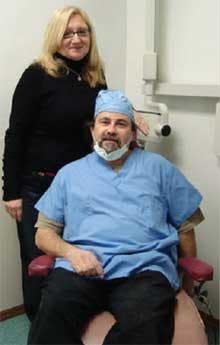The dance of life
Hygienist uses meditation to help patients find balance in life
by Judith E. Sulik, RDH, MBA
Susan Schemmel-Kraus, RDH, who is the only daughter and oldest child in a family of nine children, has always sought her own philosophical direction in life. But, as with many people, her journey has been fraught with obstacles. Practicing daily meditation, prayer, breath work, forgiveness, and gratitude is how she stays grounded. Before explaining how she has integrated these techniques as a dental hygienist seeking to reduce patients' anxiety, it is valuable to better understand the road Schemmel-Kraus has been following.
She said, “How could I possibly help alleviate a patient's anxiety unless I learned how to embrace my own life anxieties?”
Her early years were spent in Boulder, Colo., a community she described as “known for its openness to alternative thinking.” She said, “When I was ten years old, I would lie on my back in a cemetery staring at the sky, and different questions about life would enter my mind.” The majesty of the Rocky Mountains surrounding Boulder inspired a lifelong quest for answers to life's fundamental questions.
Her family eventually settled in Madison, Wis., where her father established his oral surgery practice and her mother worked as a nurse. She decided to follow her parents' career example by studying dental hygiene at the University of Minnesota. She married and had three children, two of whom were diagnosed as dyslexic. She worked part-time as a hygienist and also became an advocate for children with disabilities.
In 1996, she received the Parent of the Year Award from Learning Disabilities Association of Wisconsin. Schemmel-Kraus worked part-time for Parent Education Project of Wisconsin and was an active board member of the Wisconsin Branch of the Orton Dyslexia Society.
She has also won a battle with cancer — twice. Her divorce, after 25 years of marriage, forced her to take a fresh look at her life.
Throughout these ordeals, Schemmel-Kraus continued her search for spiritual balance through meditation. She took classes in reiki, a Japanese technique for stress reduction and relaxation that also promotes healing; Barbara Brennan techniques, which is hands-on energy healing and personal transformation; and Sacred Heart Healing, a holistic approach to helping people solve their problems and finding purpose in their lives.
In addition, she has studied and now facilitates Deeksha/Oneness Blessing. Deeksha means transfer of divine energy. It is a powerful ancient technique, which awakens certain centers in your brain responsible for love, creativity, intelligence, happiness, and grace. It also shuts down certain other centers that are responsible for fear, jealousy, inferiority, and daydreaming.
Stress in the dental office
Schemmel-Kraus realizes how easy it is for dental staff to bring personal stress to work — a disagreement with a spouse, child, or colleague; a traffic jam during the morning commute; or perhaps worries about the state of the world. Often, it is the patient who transfers or mirrors personal anxieties on to the dental hygienist.
She strives to focus her attention on each patient from the moment of greeting until the appointment's conclusion.
She said, “Each day I enjoy the dance of life; I try to do the dental dance when I'm practicing dental hygiene. I consider each patient the most important person in the world during the hour we're together. I don't think about what happened earlier in the day or about what's going to happen later; I give the patient my total focus.
“I have the three ‘Rs' that I follow: respect — prince or pauper, woman or man, I honor each patient as an equal individual; rapport — I listen, listen, discern, share, and listen some more; response — patient's trust is established and they are open to learning and acceptance of recommended treatment.”
Schemmel-Kraus recalls when a new patient sat in the chair and quickly began a semantic argument about “caps” vs. crowns. She couldn't understand why the woman was upset about something that was fairly trivial. Her response was to keep quiet, listen to the woman rant for a while, and then gently discover what was bothering this patient. She listened closely and learned that this woman was starting an argument with her because she was angry about the haircut she had gotten that morning.
She said, “Approach each person with an open heart when confronted with an antagonistic patient. When you feel you are being personally attacked, relax your mind. This is precisely the time to open your heart even wider. Insulate yourself with positive thought and emotions in order to dispel the negative energy.”
Schemmel-Kraus felt a personal conflict between her love of dental hygiene and the steady income it provides, and the desire to help people gain spiritual balance through meditation and healing. Her dilemma was solved when Dr. Dana Lubet in Middleton, Wis., hired her. Dr. Lubet, she explains, encourages every staff member to bring his or her unique skills and talents to the office. He was receptive to her suggestion to treat patients with dental anxiety with drug-free, noninvasive techniques.
Schemmel-Kraus is convinced that natural meditation and healing techniques are as effective for most people without the additional expense, risk, and hassle.
She said, “When a patient says, ‘I'm super afraid or anxious,' or if a patient shares a desire for support of a personal aspect of their life, I'll ask if they would like to try some relaxation techniques. The whole experience only takes two to five minutes.”
Schemmel-Kraus' vision of dentistry is to be more open to embracing a culture of diversity of thinking while maintaining quality of delivery. She thinks it is important that dental staff, especially dental hygienists, reflect a “heart-centered eclectic viewpoint” because patients spend only a small amount of their time in the dental office.
She said, “I don't like factory-style dental practices. Profit doesn't have to be sacrificed when time is spent making patients feel valued. We want patients to be receptive to accepting the treatment that is best for them, don't we?”
Whether a hygienist is open to using the techniques practiced by Schemmel-Kraus in the office or not, her advice for daily living should not be ignored.
She encourages everyone to live life in the moment, saying, “Connect and become aware of your breath. This helps you get in the flow, ignoring everything that happened before or might happen later. Your intuition is awakened and you're more aware of life's cues and clues. Some days, it's easy to live my own advice; other times I fail miserably. Life is a process. Fully embrace and live the experience. Feel it, see it, hear it, smell it, laugh about it, cry about it, love it, forgive it, and trust it. You'll find you're in the right place at the right time experiencing your part of life's grand plan.”
Schemmel-Kraus may be contacted at [email protected].


